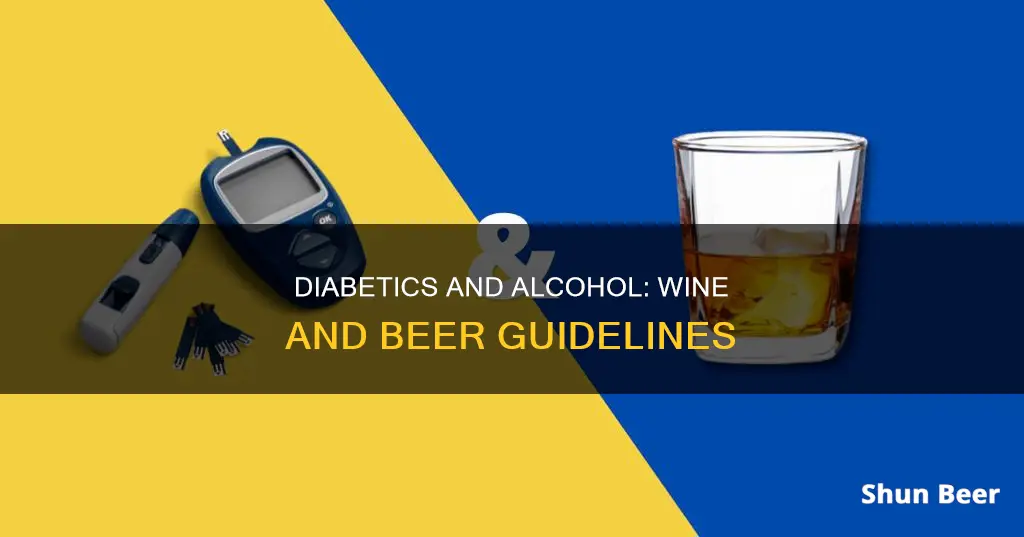
If you have diabetes, you may be wondering if it's safe to drink wine or beer. The answer depends on various factors, including your specific health status and the medications you take to manage your diabetes. In general, diabetes experts recommend that most people with diabetes can drink alcohol in moderation without compromising their health or blood glucose control. However, it's important to understand the effects of alcohol on diabetes and follow certain guidelines to drink safely.
| Characteristics | Values |
|---|---|
| Beer and wine consumption for diabetics | Diabetics can drink alcohol in moderation without compromising their health, blood glucose control, or safety. |
| Beer and wine serving size | 12 ounces of beer or 5 ounces of wine (any type other than sweet dessert wine) |
| Calories in beer and wine | Each serving of alcohol contains about 100-150 calories |
| Effect of beer and wine on blood sugar | Beer and sweet wine contain carbohydrates and may raise blood sugar. Alcohol may also cause blood sugar to drop to dangerous levels. |
| Recommendations for alcohol consumption | No more than two drinks per day for men and no more than one drink per day for women. |
| Effect of alcohol on health | Alcohol may interfere with diabetes medications, increase triglyceride levels, increase blood pressure, and cause nerve damage. |
What You'll Learn

Beer and wine contain carbohydrates and may raise blood sugar
The liver's role in glucose management is crucial in understanding how alcohol affects blood sugar. The liver typically stores and releases glucose into the bloodstream as needed. However, when processing alcohol, the liver prioritizes breaking down alcohol, temporarily halting its glucose-releasing function. This results in lower blood sugar levels, especially when drinking on an empty stomach.
While moderate alcohol consumption may not significantly impact blood sugar levels in individuals with type 1 or type 2 diabetes, excessive drinking can make glucose control challenging. Additionally, the calories from alcohol should be considered in a healthy eating plan, as they can quickly add up. It is recommended to keep alcohol consumption to a couple of times a week or less if weight loss is a goal.
Furthermore, alcohol can affect judgment and willpower, leading to poor food choices. This can further impact blood sugar control. It is important for people with diabetes to understand the effects of alcohol on their blood sugar and to drink in moderation, following guidelines, and maintaining a balanced diet are key to managing blood sugar when consuming beer or wine.
In summary, beer and sweet wine contain carbohydrates and can raise blood sugar levels. Alcohol's impact on the liver's glucose management, appetite stimulation, and interference with diabetes medications are important considerations for individuals with diabetes. Drinking in moderation, following guidelines, and maintaining a balanced diet are key to managing blood sugar when consuming beer or wine.
Swift's Beverage Choice: Beer or Bubbly?
You may want to see also

Excess alcohol can cause blood sugar to drop to dangerous levels
Hypoglycemia can be dangerous and may cause symptoms such as nervousness, anxiety, sweating, chills, irritability, dizziness, blurred vision, and more. If you experience any of these symptoms, check your blood glucose levels. If your blood sugar is below 70 mg/dL, you are hypoglycemic. In this case, you should treat the hypoglycemia with a fast-acting form of sugar, such as glucose tablets, gel, or juice.
To avoid hypoglycemia, it is important to drink in moderation. This means no more than two drinks per day for men and no more than one drink per day for women. It is also important to avoid drinking on an empty stomach, as this can cause a rapid drop in blood glucose. Instead, drink alcohol with food and be mindful of your eating strategy to avoid overeating and overdrinking.
Additionally, it is recommended to mix alcoholic drinks with water or calorie-free drinks instead of sugary mixers. Alcoholic drinks are often high in calories, which can make it more difficult to lose weight. Beer and sweet wine also contain carbohydrates, which may raise your blood sugar.
Finally, always wear a medical alert bracelet or necklace that says you have diabetes. This is important because the symptoms of hypoglycemia can be similar to those of drunkenness. By wearing a medical alert, you can help ensure that you receive proper care in an emergency.
Beer Sleeves: Do They Keep Drinks Cool?
You may want to see also

Alcohol can interfere with diabetes medication
Alcohol can have a detrimental impact on the effectiveness of diabetes medication. This is especially true for people who take insulin or other blood glucose-lowering medications, such as those in the sulfonylurea and glinide categories. The combination of alcohol and these medications can lead to a heightened risk of hypoglycemia, a dangerous condition where blood sugar levels drop too low.
Endocrinologist Alan Graber warns that alcohol can increase the risk of late-onset hypoglycemia in people with diabetes, especially when combined with insulin or other blood glucose-lowering medications. It is crucial for individuals with diabetes to consult their healthcare team and understand the type of medication they are taking and how it may react with alcohol.
The impact of alcohol on blood sugar levels is twofold. On the one hand, moderate alcohol consumption may cause blood sugar levels to rise, while on the other hand, excessive alcohol intake can lead to a dangerous decrease in blood sugar levels, particularly for those with type 1 diabetes. This delicate balance underscores the importance of moderation and awareness when it comes to alcohol consumption for individuals with diabetes.
Additionally, alcohol can interfere with the positive effects of oral diabetes medications or insulin. It is recommended that individuals with diabetes who choose to consume alcohol do so in moderation and only when their blood sugar levels are well-controlled. It is also advised to consult with a doctor to determine if drinking alcohol is safe, given the individual's specific circumstances and medication regimen.
To minimize the potential negative impacts of alcohol on diabetes management, it is recommended to follow certain guidelines. Firstly, it is important to limit alcohol consumption to no more than two drinks per day for men and one drink per day for women. Secondly, drinking alcohol on an empty stomach should be avoided, as it can lead to a rapid decrease in blood sugar levels. Thirdly, it is crucial to have an eating strategy in place when drinking to avoid overeating and maintain stable blood sugar levels.
Crafting the Perfect Black and Tan Beer Drink
You may want to see also

Alcohol stimulates appetite, which may affect blood sugar control
Alcohol stimulates your appetite, which can cause you to overeat and may affect your blood sugar control. Alcohol can also affect your judgment and willpower, leading to poor food choices. It is important to have an eating strategy in place to avoid overeating and overdrinking in social situations. Alcohol can make you more relaxed, which may lead to poor decisions.
If you are diabetic and choose to drink alcohol, it is recommended that you do so in moderation and only when your diabetes and blood sugar levels are well-controlled. It is also advised to consult your doctor to determine if drinking alcohol is safe for you.
When drinking, it is important to avoid sugary mixed drinks, sweet wines, or cordials. Instead, mix liquor with water, club soda, or diet soft drinks. It is also recommended to switch to a non-alcoholic drink after your first drink and to always drink with food.
Additionally, it is crucial to monitor your blood sugar levels before and after drinking, especially if you are taking insulin or other medications that affect your blood sugar. Alcohol can interfere with the positive effects of oral diabetes medicines or insulin, increasing the risk of hypoglycemia.
By understanding the effects of alcohol on your blood sugar control and following these guidelines, you can make informed decisions about alcohol consumption while managing your diabetes.
Beer and Canker Sores: Is It Safe to Drink?
You may want to see also

Alcohol may increase blood pressure
If you have diabetes, drinking alcohol may cause your blood sugar to rise or fall. Beer and sweet wine contain carbohydrates and may raise blood sugar. Alcohol can also interfere with diabetes medication or insulin. For these reasons, it is recommended that people with diabetes drink occasionally and only when their blood sugar levels are well-controlled.
When it comes to alcohol's impact on blood pressure, excessive alcohol consumption is linked to an increased risk of high blood pressure or hypertension. Hypertension is a common condition worldwide and a leading cause of cardiovascular disease. Alcohol affects blood pressure in several ways:
Firstly, alcohol affects the renin-angiotensin-aldosterone system (RAAS), which is controlled by the kidneys and regulates blood pressure through the hormones renin, angiotensin, and aldosterone. Alcohol increases blood levels of renin, causing blood vessels to constrict and narrow, which in turn increases blood pressure.
Secondly, alcohol reduces the production of vasopressin, an antidiuretic hormone that normally causes the body to retain water. This reduction leads to a diuretic effect and dehydration.
Thirdly, alcohol consumption is linked to increased cortisol levels, a hormone that regulates the body's response to stress, metabolism, immune function, and inflammatory pathways. Higher cortisol levels increase the release of catecholamines, chemicals that help keep the body functioning properly but also result in higher fluid retention and increased blood pressure.
Additionally, alcohol decreases baroreceptor sensitivity. Baroreceptors are receptors that help regulate blood pressure by detecting when blood vessels need to stretch or increase in diameter. By impairing these receptors, alcohol contributes to increased blood pressure.
Finally, alcohol consumption increases the amount of calcium that binds to blood vessels, making them more sensitive to compounds that constrict them, which further increases blood pressure.
The more alcohol you consume, the higher the risk of developing hypertension. Regular drinking, particularly over the age of 35, increases this risk, with one drink per day being enough to have an impact. Therefore, it is recommended to limit alcohol consumption to one or two glasses infrequently to prevent health complications, including high blood pressure.
Drinking Beer Legally in Dry Counties: What's Allowed?
You may want to see also
Frequently asked questions
In general, diabetics can drink alcohol in moderation without compromising their health, blood glucose control, or safety. However, it's important to consult with a doctor to understand how alcohol affects your specific condition and to ensure it is safe for you.
Drinking alcohol can cause a diabetic's blood sugar to rise or fall. Beer and sweet wine contain carbohydrates and may raise blood sugar. Alcohol also stimulates appetite, which can lead to overeating and affect blood sugar control. Additionally, alcohol can interfere with diabetes medications and increase the risk of nerve damage.
Diabetics who choose to drink alcohol should do so in moderation, ensuring it doesn't exceed one drink per day for women and two drinks per day for men. It is important to not drink on an empty stomach and to avoid sugary cocktails, sweet wines, or cordials. Always wear a medical alert indicating you have diabetes, and regularly monitor your blood sugar levels.







